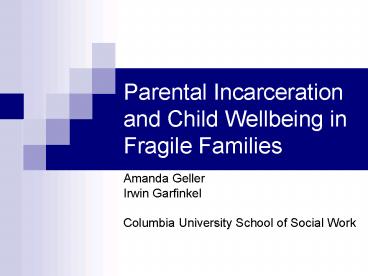Parental Incarceration and Child Wellbeing in Fragile Families - PowerPoint PPT Presentation
1 / 20
Title:
Parental Incarceration and Child Wellbeing in Fragile Families
Description:
Parental incarceration is increasingly prevalent in United States cities, ... This report presents findings through children's third birthday. Fathers' Incarceration: ... – PowerPoint PPT presentation
Number of Views:85
Avg rating:3.0/5.0
Title: Parental Incarceration and Child Wellbeing in Fragile Families
1
Parental Incarceration and Child Wellbeing in
Fragile Families
- Amanda Geller
- Irwin Garfinkel
- Columbia University School of Social Work
2
Summary of Findings
- Parental incarceration is increasingly prevalent
in United States cities, particularly among
fathers. - Fathers with incarceration histories earn less
than other fathers and are less likely to be
stably employed upon their release. - Children whose fathers have been incarcerated
live in households experiencing significantly
more material hardship and more marital and
residential instability. - Differences in health and development are small,
but suggest further disadvantage as children grow
older.
3
Presentation Agenda
- Motivation
- Data The Fragile Families and Child Wellbeing
Study - Fathers Incarceration
- Descriptive Statistics
- Labor Market Outcomes
- Family Stability
- Child Wellbeing
- Incarceration and Other Father Absence
- Mothers Incarceration
- Summary and Implications
4
Motivation
- By the end of 2004, the United States had almost
1.5 million people incarcerated, more than half
of whom are parents. - As of 2002, more than 2 million children had a
parent in jail or prison. - Despite the prevalence of parental incarceration,
we know little about its short or long term
effects on children.
5
Motivation Theoretical Model
Father Characteristics
Father Incarceration
Family Instability
Child Wellbeing
6
Data The Fragile Families and Child Wellbeing
Study
- Panel survey of 3800 new unwed parents
(1998-2000), plus 1100 married parents - Representative of births in large cities
- Large sample of unmarried fathers has high
prevalence of incarceration history - Follow-up interviews at 1, 3, 5, 9 years
- This report presents findings through childrens
third birthday
7
Fathers Incarceration Descriptive Statistics
8
Fathers Incarceration Labor Market Outcomes
- Fathers who have been incarcerated are less
stably employed, and earn less, than their
never-incarcerated counterparts.
9
Fathers Incarceration Family Instability
- Material hardship Did someone in family
- Receive free food Get evicted
- Lose phone service Not pay full utility bills
- Lose utility services Not pay full
rent/mortgage - Not see a doctor when one was needed
- Public Assistance receipt
- Marital status
- Residential moves
10
Fathers Incarceration Family Instability
- Families in which the father has been
incarcerated experience significantly more
instability.
11
Fathers Incarceration Child Wellbeing
- Child Health mothers (5-point) rating,
overweight or obese status - Cognitive Development PPVT (measures size and
range of words children understand) - Aggression eg. tantrums, destroying things,
hitting - Anxious/Depressive behavior eg. nervousness,
fear, sadness - Withdrawal eg. Avoiding eye contact, nonresponse
to affection
12
Fathers Incarceration Child Wellbeing
- No significant differences in physical health or
cognitive development, but children with
incarcerated fathers score significantly worse on
two of three mental health measures
13
Fathers Incarceration and Other Father Absence
- To what extent are hardship and mental health
differences uniquely related to incarceration? - Comparing different types of father absence
- Fathers incarcerated for portion of childs life
- Fathers who were never incarcerated, but
- Never lived with their partner (but had seen
child) - Never saw (or dont know about) child
14
Fathers Incarceration and Other Father Absence
15
Fathers Incarceration and Other Father Absence
16
Fathers Incarceration Summary
- Fathers with incarceration histories perform
significantly worse in the labor market. - Families where a father has been incarcerated
experience more instability and material
hardship. - Children in these families display slight
developmental disadvantages. - Child wellbeing is likely to worsen as children
age - Developmental indicators more refined for older
children - Cumulative effects of disadvantage
17
Maternal Incarceration
- Mothers incarceration differs from fathers
- Far less prevalent (7 of sample vs. 41)
- Shorter sentences (Avg. 4.9 months vs. 12.3)
- Concentrated before childs birth (70 of
ever-incarcerated mothers vs. 86 of fathers) - Mothers with incarceration histories face
significant disadvantage - Less likely to be married/cohabiting
- Less stably employed
- Earning less
18
Maternal Incarceration, Family Instability, and
Child Wellbeing
- Children whose mothers have been incarcerated
- Are less likely to live with both biological
parents - Live in households with more material hardship
and receiving more public assistance - Move more frequently
- Do not differ significantly on health or
developmental measures
19
Summary of Findings
- Parents with incarceration histories perform
significantly worse in the labor market. - Families where a parent has been incarcerated
face more material hardship and other
instability. - However, by age 3, developmental effects are
small. - Slight differences in mental health outcomes
- No differences in health or cognitive outcomes.
20
Implications for Policy and Practice
- Effects of incarceration on child wellbeing are
small at age 3, but may grow. - Health, cognitive, and mental health outcomes are
better measured as children age - Cumulative effects of disadvantage and
instability - Material hardship and instability suggest the
need for assistance at the point of incarceration - Re-evaluating family income to ensure PA
resources meet new level of need - Continuity of social services in the case of a
move































